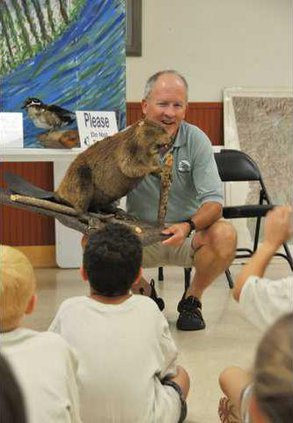Working for a living: Environmental sciences
This summer, our In Schools page focuses on career options available to recent graduates and features stories from professionals with unique jobs.
At a glance
Naturalist or conservation scientist
Overview: Conservation scientists manage, improve and protect natural resources. They work with landowners and governments to use and improve the land while safeguarding the environment. They may also have specializations, such as forestry or marine life.
Educational requirements: Workers in this occupation need, at a minimum, a bachelor's degree in forestry, environmental science, range management or a related discipline
Job outlook: About two-thirds of conservation scientists and foresters work for federal, state or local governments. Slower than average job growth is projected; most new jobs will be in governments and in private sector forestry and conservation consulting.
Source: Bureau of Labor Statistics
Often students claim to want a career that takes them out of a cubicle, out of the office, into the fresh air and sunshine.
But, in reality, how do you accomplish that?
Well, if you take the path of a naturalist like Peter Gordon, education director at Elachee Nature Science Center, you can work with animals, teach people about them and even lead hikes through wildflowers - and love your job, too.
"An old college friend described our work as, it's something that never gets dull," Gordon said.
We asked Gordon about how he was inspired to work with nature, and found out it's a lot easier these days for a student to pursue a path of study in the natural sciences - although, the job market after college can get tough.
Question: Describe your duties as education director.
Answer: I basically oversee all aspects of our educational programs; we see about 35,000 kids a year from school districts in the area. I supervise the training of the staff, design the curriculum, organize the field trips. That's a very, very rewarding challenge.
(The center receives calls about wild animals, too, and) we trouble-shoot all the time. I'm kind of recognized as the bird guy, the snake guy and any-kind-of-animal-interaction-that-could-happen-in-someone‘s-backyard kind of guy. ... I betcha we get hundreds of animal calls about baby birds, baby rabbits, ... it's a natural thing for us. ... It's a good way for us to do a lot of on-the-ground education with someone right there on the phone. Which makes it rewarding.
Q: What kind of training do you have?
A: My training was in liberal arts, and so my natural history training was after I got out of college. ... I worked at the University of Georgia's Marine Extension Service. I got to work with some really fine teachers and it really lit a fire under me as far as natural processes at work.
One of the most attractive things about getting a job out of doors is you're constantly learning. You are learning things every day. ... If you're lucky enough, you can share it with other people as well.
Q: What inspired you to work with animals? Is it something you always wanted to do?
A: At (UGA's Marine Extension Service) we were taking a boat out and catching fish and taking it back, and that's a kid's dream come true - and I was getting paid to do this. I think there's just people who have a love of natural things and trying to understand and know it better - what about this coloring and habitat this animal has - and you love being outside and you love conveying that information to people as well.
Q: What do you love about your job?
A: Three things: When you get to work with a lot of really unique, like-minded people; we get to work with children with fresh faces and sponge-like spirits that want to learn everything you tell them; we get to work in a beautiful place, where you can watch the seasons change.
Q: What recommendations do you have for students thinking of a similar career path?
A: Today there's a lot of different degrees that are available. UGA has, through their forestry school, great training in natural sciences, probably (for) people who would work for (Department of Natural Resources) or a ranger at a state park. A lot of schools have programs to teach you to be a naturalist.
Do a lot of research on the front end to see which schools are doing this work and keep your fingers crossed. ... It's a field where there's a lot of part-time work available, but full-time jobs, there's a lot of competition for them. But great educational opportunities.

